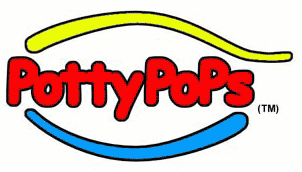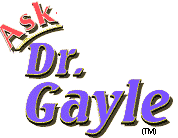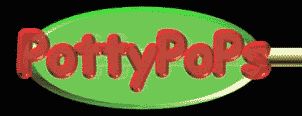 |
||||||||

Dr. Peterson's Potty Pops™ Program

When potty training is a must! An innovative program...
Potty training your toddler is a matter of behavioral conditioning. Rewarding a child with a potty pop after successfully using the toilet creates an immediate and positive association that allows children to learn potty training with ease. The history of the development of this product was inspired by Dr. Gayle's grandson.
My 3 Year Old Displays No Interest in Potty Training
Answer: Consult with your pediatrician to rule out any physical problems that might cause her to “fuss” about using the toilet. If there are no medical reasons for her reluctance, your little girl may need an extra “push” to use the toilet if your circumstances require it. It may be time for communicating your expectation with more conviction, and in a way that peaks her interest. You may also need to motivate her with a reward program that will better inspire her performance. Read on for details!
First, communicate to your daughter that it is one of the rules of the daycare that all 3 year-olds must use the potty, and so you are going to help her learn how to do this. Let her know that her body is equipped with sphincter muscles that help her control when the pee and poop is held and when it comes out.
Secondly, get creative! Draw her a picture of the bladder and how it works, or use a small balloon filled 1/4 with water, using your fingers to demonstrate how we can use our sphincter muscles to “hold on” and “let go” of urine at will. Show her how difficult it can be to hold pee when the fluid brims to the top, but how much easier it is when we empty our bladders when they are less than half filled, such as, every 2-3 hours. Ask her if she can tell when her bladder is “this” full or “that” full, engaging her in considering the physical cues that tell her it is time to use the potty. Captivate her interest in how the body works, but don’t stop there! Make it clear that you believe in her body’s ability to learn this process because she is now 3 and her body is ready to use these muscles.
Finally, consider a reward that works for your child. It may be a little known fact that many parents resort to candy reinforcement for toilet training. There is no need to create an ongoing pattern of using food for reward, but at this age, many children do respond to candy, when other nonfood rewards, such as “stickers” have languished. Lollipops, held on a stick, hold great appeal to children of this age. Perhaps it has something to do with the still virulent “sucking” reflex that brings such pleasure. When other reinforcement has failed and potty training is necessary “potty pops” may do the trick!
History on the development of PottyPops™:
The “potty pops” program was inspired by my grandson who was sporadic in his potty use until he was consistently rewarded with a small lollipop immediately and only after successfully using the toilet. His mother found them superior to other candy alternatives (m&m’s or jelly beans) because the lollipops were often licked only a few times before being discarded, so he was not eating as much sugar. Ideally, these rewards would be small, flat lollipops (for safety from choking) and vitamin enriched. I eventually trademarked the concept in hopes of providing a smaller, safer lollipop than those on the market, and a more nutritious alternative for parents who felt comfortable with this approach.
Feel free to adopt or create a similar program, substituting with your own resources. Instructions for use of this approach to potty training appear below.
Another Question & Answer on Potty Training...My 3 Year Old Is Still Not Fully Potty Trained
Instructions for use:
Introduce the use of the toilet to your 2-3 year old in a positive manner. Tell them they will receive a potty pop of their choice after each use. Do not give potty pops at any other time or for any other reason except after successfully using the toilet. Give them consistently after each use for three-six weeks. After this initial training period, give potty pops only as asked for by your child. Toilet training will become a learned, conditioned reflex which is generalized and potty pops will no longer be necessary for reinforcement. Potty pops are easy to use and easy to carry anywhere.
Potty training does not have to be difficult. Follow this easy behavioral program and your child will learn to recognize the physical signals necessary to use the toilet and feel good about it! Remember, too, that potty pops are vitamin enriched. Each time your child receives a potty pop they also get the vitamins and minerals they need for developing strong, healthy bodies.
Best wishes for an enjoyable potty training experience!
Dr. Peterson’s potty pops program copyrighted 1999 by Gayle Peterson.
|
NOTE: We are currently looking for a sponsor to manufacture and distribute this product. If you have interest in doing so please contact us at (530)
346-2534 or gp@askdrgayle.com.
|
Home • About Dr. Gayle • Counseling • Speaking • Seminars • Articles • Books • Contact
Copyright © 1996-2005 Dr. Gayle Peterson. All rights reserved.



